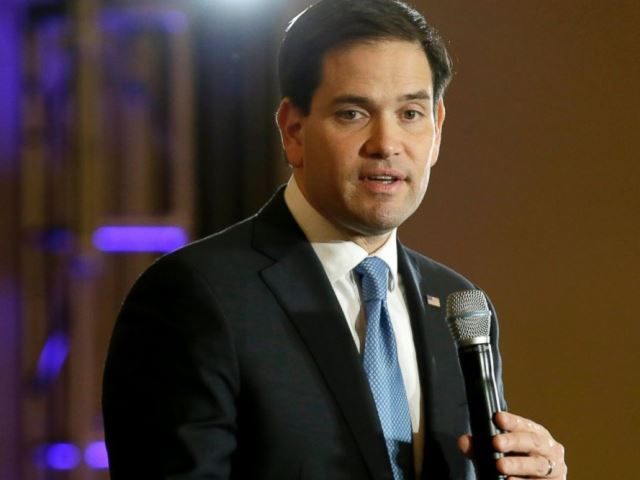Sen. Marco Rubio’s campaign has cancelled almost $1 million worth of TV-advertising in the Hawkeye State, just one week prior to the state’s first-in-the-nation caucus.
Rubio also cancelled around $125,000 in paid advertising in New Hampshire, which votes on February 9th, eight days after Iowa.
Rubio has been advertising extensively in both states since December. In Iowa alone, Rubio has already spent around $3 million on paid advertising. He also still has advertising-slots booked in both states, but his campaign’s decision to scale back his buys suggests a change in strategy, just as voters are preparing to cast their ballots.
The Rubio campaign spun the news to Politico that the cuts in ads in Iowa and New Hampshire were to increase the campaign’s ad buys in South Carolina. But South Carolina votes on February 20th.
Politico reported that the Rubio campaign had added to its buys in the Palmetto State, but media booking information provided to Breitbart News indicated no changes to Rubio’s ad reservations there. Rubio has reserved a few million dollars worth of ad time in South Carolina in the coming weeks — but it doesn’t appear that he has added any additional time to his paid advertising.
This week, both Donald Trump and Jeb Bush used their funding to reserve additional advertising-time in South Carolina.
It is possible, however, that Rubio’s campaign discarded ad-time in Iowa and New Hampshire to pay for the advertising time already reserved in South Carolina. When a campaign reserves future ad-time, it doesn’t pay for it when it places the order. The campaign pays for it just before it airs.
If the Rubio campaign says the decision to scale back advertising in Iowa and New Hampshire is linked to the primary in South Carolina, it seems likely the changes have been made to pay for ads currently reserved in South Carolina.
In Iowa, Rubio’s campaign trimmed just over $830,000 in paid advertising. As noted, the amount cut in New Hampshire is reported to be around $125,000. Combined, these savings would pay for most of the time Rubio has reserved in South Carolina over the next two weeks.
The cuts in advertising obviously raise questions about how aggressively Rubio is contesting Iowa and New Hampshire. According to his campaign, his current strategy is to place third in Iowa, scond in New Hampshire and hope for a victory in South Carolina.
Rubio is currently polling in 3rd in Iowa, but far behind the leaders, Trump and Ted Cruz.
In New Hampshire, Rubio is polling 4th, with other candidates packed tightly around him.
In South Carolina, Rubio is a distant 3rd, with Jeb Bush very closely behind him.
Iowa votes in just a fortnight. Many other campaigns have added to their paid advertising this week in a final push for support. Rubio has to hope that he can hold his current position as voters make their final decision of which candidate to support.
Beyond strategy, however, Rubio’s decision to cut his ad-spending in the first two states raises questions about the state of his campaign’s fundraising.
Rubio’s campaign has not released any information about his fourth quarter fundraising totals. Both Ted Cruz and Ben Carson announced their fundraising totals soon after the quarter closed on December 31st. Both campaigns raised impressive amounts of money.
The final totals will be publicly available after January 31st, when the information is published by the Federal Election Commission. But most candidates follow the standard rule of political campaigns — immediately trumpet good news and postpone the revelation of bad news.
Breitbart News reached out to the Rubio campaign to see if there were any plans to release fundraising numbers ahead of the legally required public disclosure. Breitbart News also asked if the campaign could provide a general ballpark of how much it had raised in the Fourth Quarter. The Rubio campaign did not respond to Breitbart News.
Rubio’s fundraising to date has been unimpressive. In the third quarter, Rubio raised just $6 million, half of the amounts raised by Ted Cruz and Ben Carson. This amount was also half the amount Rubio had raised at the beginning of his campaign, in the second quarter. Rubio’s second quarter total, though, also included just over $3 million that he transferred from his Senate reelection account.
After Jeb Bush, whose super PAC amassed more than $100 million at the beginning of the campaign, Marco Rubio has spent more money than any other candidate. In recent weeks, the campaign has even had to defend its increased use of private charter planes, over the commercial flights the campaign used to brag about using.
Unless Rubio raised a significant amount of money in the fourth quarter–much more than he has raised previously–his campaign would have difficulty fulfilling all the ad reservations they had made. The cut in almost $1 million in advertising in Iowa and New Hampshire, combined with the campaign’s silence on its recent fundraising, suggests that the Rubio campaign is nearing a cash-crunch.
The theory of Rubio’s campaign is that he will eventually emerge as the consensus candidate to challenge Donald Trump and Ted Cruz. The shift in his advertising suggests, though, that his campaign no longer believes this consolidation will happen in time for Iowa and New Hampshire.
It looks like the campaign is conserving cash now, hoping that he will emerge as the favored challenger to Trump and Cruz by the time South Carolina votes. Voting there, however, is a month away.
Rubio seems forever to be pushing into the future the point that his campaign will seriously contest a state. If he waits too long, that future may never arrive.

COMMENTS
Please let us know if you're having issues with commenting.